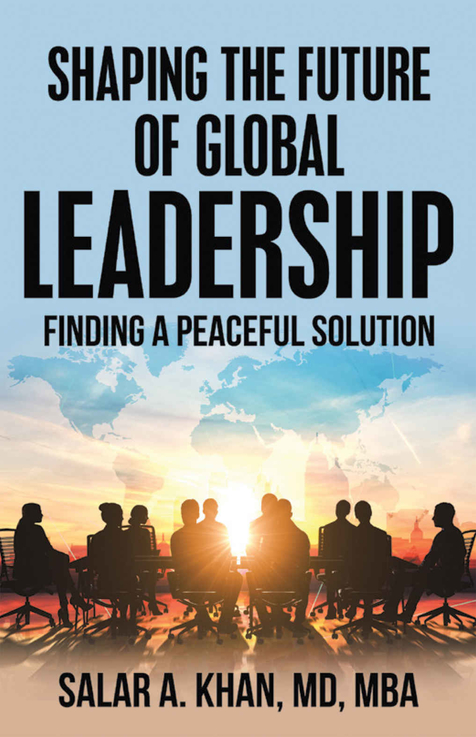
A well-traveled medical practitioner and executive has created a manual with global conscience for recognizing, training and electing trustworthy, admirable world leaders in Shaping the Future of Global Leadership: Finding a Peaceful Solution.
Author Khan states at the outset that he has religious beliefs but doesn’t wish to “disturb or distract” those with or without such beliefs who read his guide, but it does provide some basis for his treatise, suggesting God can also be referred to as a universal organizing principle (UOP). He asserts that among all great world religions are overarching principles for how we must live and treat one another to survive, and those principles come into play in the selection of reliable leaders, and how the world can move forward peacefully.
Khan has organized his credo in logical order: observations about the earth and the universe indicating a pattern to life, the inculcation of our leaders to best practices for global survival, the development of individual leaders from an early age, the initiation of a worldwide strategy to ensure that future leaders are people we would choose, rather than those who have risen to or seized power out of personal ambition or greed. It’s a decidedly far-reaching focus in a field that normally focuses narrowly on leadership in business.
Natural-born leaders (NBLs) are those who make decisions based on best available data, in a morally sound way, and hold themselves accountable for problems and failures. Khan’s plan for improved global leadership involves creating Independent Global Leadership Organizations (IGLO) to locate, analyze, educate and certify potential candidates who can then stand for election. The tenets of the IGLO would be accepted by all nations, and funded by all. He envisions such a template could be in place as early as 2024.
Khan states that we can see earthly order through geology, biology, and genetics, and learn from that. Taking an analogy from the Koran, he compares the delicate web of the spider to the protection that we seek to create for our families and ourselves. These complex webs can be easily destroyed; we are obligated as thinking beings to build as strong a web as we can for our loved ones, and we will reap the consequences of our poor choices. Here he’s less persuasive than he is when offering more nuts-and-bolts prescriptions for global dynamics, as these more abstract ideas are interesting, but less actionable.
Though much of this current book is given over to theory, one senses that there may be a more complete manual to follow, placing less stress on religious underpinning with regard to leadership development, and more on pragmatic step-by-step guidelines, which are covered here only in the final pages. He does offer a pragmatic self-assessment for competence for leadership self-evaluation, including statements such as “I am not afraid to make changes to the status quo,” and “I am serious and sincere in my decision-making,” but some of this may be a bit basic for those on the global stage.
That said, the effect of the book is cumulative, so when everything is taken together, it’s a persuasive and original take on leadership that can be used on both small and large scales. Khan, a much awarded and recognized professional, has personal experience of rising to a leadership role, and that shows in the book’s methodical presentation. Thoroughly optimistic and thought-provoking, the book will attract readers who share the author’s vision of a world of united nations whose leaders are worthy of their chosen roles.
Book Links
STAR RATING
Design
Content
Editing
Get an Editorial Review | Get Amazon Sales & Reviews | Get Edited | Get Beta Readers | Enter the SPR Book Awards | Other Marketing Services






















Leave A Comment